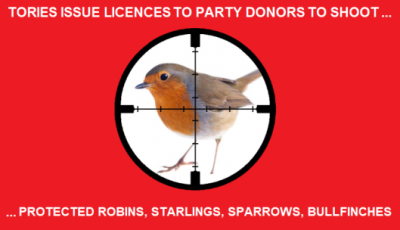England and Wales Authority Issues Licences to Property Developers to Kill Protected Robins, Starlings, Blackbirds, Sparrows, Bullfinches

Natural England and Natural Resources Wales have mysteriously given the go-ahead for protected species such as robins, starlings, blackbirds and bullfinches to be shot: Licences granted to kill multiple Red-listed species
I say mysteriously, because the reasons given are very strange.
When asked why these licences have been granted, Natural England simply claim the birds are a “threat to public health and air safety” and the slaughter is to “prevent serious damage to livestock”.
It’s somewhat hard to imagine how starlings and robins could ever be a danger to the public or herds of cows.
Of course, the fact that these protected nesting birds are one of the biggest problems facing property developers (*see information below) when they attempt to develop brownfield sites for residential housing is nothing at all to do with the decision.
As, I’m sure, is the fact that the Chair of Natural England, Andrew Sells, also happens to be one of the founders of Linden Homes, a property development business specialising in the development of brownfield sites for residential housing.
Tory government ministers chose Andrew Sells – a venture capitalist with no experience of ecological or environmental matters – as the Chair of Natural England a few years ago.
A surprise decision which I’m sure was not at all influenced by the fact that Andrew Sells is a major Tory party donor and the fact that property developers in general are some of the Tories’ biggest donors.
No conflicts of interest at all then.
*
Note to readers: please click the share buttons below. Forward this article to your email lists. Crosspost on your blog site, internet forums. etc.
Note
*All wild birds, their nests and young are protected throughout England and Wales by the Wildlife & Countryside Act 1981 (as amended). It is illegal to kill, injure or take any wild bird, or damage or destroy the nest or eggs of breeding birds.
If nests, whether completed or in the process of being built, are found on site, any works with the potential to damage or destroy the nest, eggs or young birds, must stop until the birds have completed breeding.
Birds may nest on machinery or scaffolding and other temporary site structures. If this happens the equipment cannot be used until the birds have finished nesting and such areas may need to be sealed off to prevent disturbance.
Breaking the law can lead to fines of up to £5000 per offence and potential prison sentences of up to six months. Vehicles implicated in an offence can be compounded and both the company, and/or the individual(s) concerned, can be held liable.
Featured image is from Pride’s Purge

